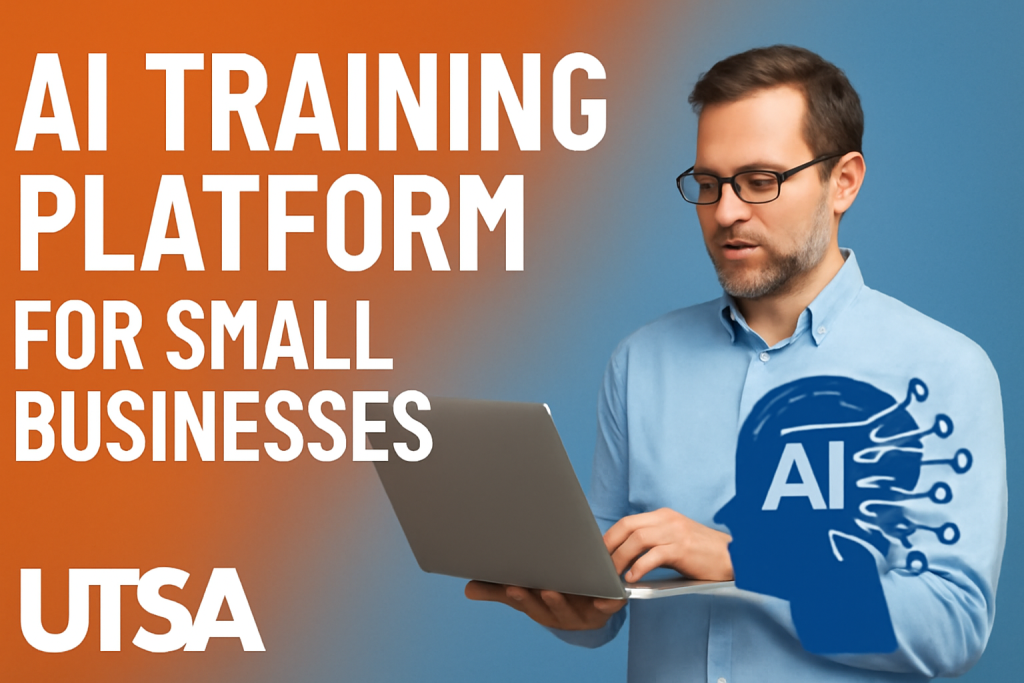Small businesses encounter a significant competitive disadvantage. Many owners lack the digital skills required to succeed in today’s market. A research team from the University of Texas at San Antonio has identified this gap and is developing a solution.
Small businesses face a critical competitive disadvantage. Many owners lack the digital skills needed to thrive in today’s market. A University of Texas at San Antonio research team has identified this gap and is building a solution.
The team includes Roger Enriquez, associate professor of criminology and criminal justice, Richard Harris, professor of social work, Christopher Reddick, professor of public administration, and David Han, Romo Endowed Professor in the Carlos Alvarez College of Business.
Their research reveals a stark reality. Businesses using digital tools, such as AI training platforms, recovered faster from the pandemic. Those without digital skills continued to struggle even after restrictions lifted.
Why Digital Skills Create Market Winners
The research shows clear patterns. Small business owners who use websites and e-commerce platforms experience more revenue growth. This advantage becomes more pronounced for older business owners who traditionally avoid these tools.
“The ones that didn’t use a lot of digital tools were the ones that continued to struggle, even post-pandemic,” Enriquez explained.
The team published their findings in “Digital Divide and Digital Engagement in Small Business Owners: An Examination of Survey Data” in the journal Information, Communication & Society in 2025.
During the pandemic, many small business owners applied for emergency grants and loans. They arrived with shoeboxes full of receipts but couldn’t navigate digital applications.
“Many of these folks would come in with a shoebox of receipts and the whole application had to be digital,” Reddick said. “Many of these folks just didn’t have that skillset [despite being] good entrepreneurs and hardworking.”
How Demographics Shape Digital Divides
The research uncovered deeper patterns beyond simple technology gaps. Age, gender, ethnicity, education, and income all influence digital engagement among small business owners.
“The digital divide, often perceived as a generation gap, is also a significant sociotechnical and socioeconomic issue,” Han said. “Our studies conducted in San Antonio reveal that factors like age, gender, ethnicity, education, and household income profoundly influence digital access and engagement among small business owners.”
This insight shaped their approach to developing training solutions. Generic training programs fail because they ignore these diverse backgrounds and needs.
AI Solution Delivers Personalized Training Edge
The UTSA team turned to artificial intelligence for their solution. They’re developing a comprehensive AI training platform using generative-AI-based chatbots and Agentic AI technology.
This approach provides personalized, on-demand coaching. Business owners receive step-by-step guidance tailored to their specific situations and skill levels.
The platform addresses practical challenges. It shows owners how digital tools benefit their specific businesses. This targeted approach increases adoption rates and long-term success.
Dinesh Anumolu, professor and associate dean of research and innovation at UTSA’s College of Business, said: “This innovative software will provide small business owners with personalized training and support tailored to their unique challenges and goals.”
Market Impact for Business Ecosystem
This AI training platform represents more than just education technology. It addresses a fundamental market inefficiency that keeps capable entrepreneurs from competing effectively.
The broader corporate training market is already embracing AI customization. Companies use AI to create personalized learning experiences that reduce costs and improve outcomes.
Small businesses need similar advantages to compete with larger companies that have dedicated IT resources.
“There are always ways to integrate things and streamline, align, and amplify,” Harris said. “The beauty of it is that everybody could stand to improve how they do business in a way that makes sense for them.”
What This Means for Business Leaders
The UTSA research highlights a critical competitive opportunity. Digital literacy, accelerated by the AI training platform, directly correlates with business resilience and growth potential.
Business leaders should recognize that digital skills training isn’t just about technology. It’s about maintaining a competitive position in an increasingly digital marketplace.
The AI-powered platform approach offers scalable solutions. Organizations can provide personalized training without the high costs of traditional programs.
This development also signals broader trends in AI-assisted learning. Businesses investing in similar personalized training capabilities will likely see better employee adoption and business outcomes.
The UTSA team’s work demonstrates how academic research can address real market challenges. Their platform could help level the playing field for thousands of small businesses currently disadvantaged by the digital divide.


